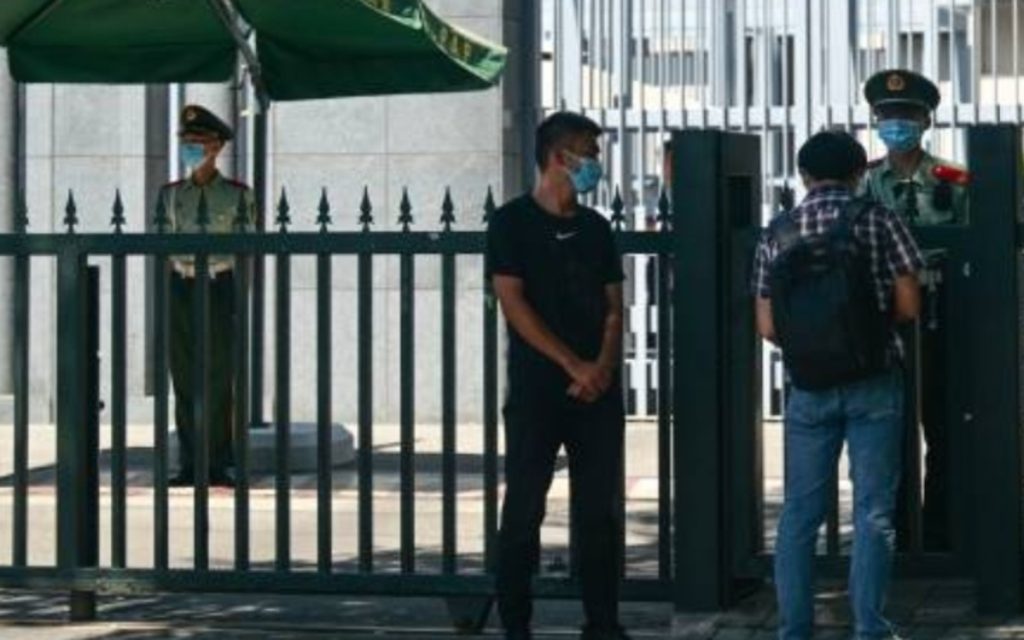
Police and security personnel outside the Japanese embassy in Beijing, August 29, 2023. Credit: STR/AFP
Beijing immediately lodged a strong protest with the Japanese embassy, the Chinese Foreign Ministry stated.
The ministry emphasized it would “protect the safety of all foreign nationals” residing in China.
Sanae Takaichi Remarks on Taiwan Escalate Japan-China Relations
Analysts say the remarks have intensified diplomatic tensions between Tokyo and Beijing.
A Foreign Ministry spokesperson in Tokyo clarified that Takaichi’s comments were “part of a broader defense discussion,” highlighting security policy considerations.
China’s state-run media reported the postponement of at least two Japanese films scheduled for release, citing current sensitivities.
The Chinese Foreign Ministry also advised citizens to avoid non-essential travel to Japan, according to official statements.
Market Reactions and Economic Implications
Tokyo stocks fell following the diplomatic tensions, analysts noted as investor confidence declined.
The Nikkei 225 index recorded a 1.2% drop in early trading, financial sources reported.
Experts attributed the decline to uncertainty over Japan-China relations and potential regional instability.
Industry analysts said supply chains and trade exchanges may face indirect pressure if tensions persist.
Official Warnings for Japanese Citizens in China
The Foreign Ministry urged citizens to “avoid crowded areas” and remain alert to local security information.
Officials highlighted that Japanese embassies and consulates are maintaining close contact with nationals across major Chinese cities.
The ministry reinforced that travelers should “adhere strictly to local safety guidelines” and report any emergencies immediately.
Beijing’s Formal Protest and Safety Commitment
The Chinese Foreign Ministry reiterated that Takaichi’s statements were “unacceptable and harmful to bilateral relations.”
Beijing emphasized the principle of sovereignty, stating that comments regarding Taiwan “cannot be tolerated.”
Diplomats confirmed that the protest was delivered through formal channels to Tokyo’s embassy in Beijing.
The ministry also stressed that protection measures for foreigners, including Japanese citizens, remain a priority.
Cultural Fallout: Postponed Japanese Film Screenings
Chinese state media reported that at least two Japanese films will be postponed indefinitely due to the diplomatic situation.
Producers cited “current sensitivities and public sentiment” as the reason for delays.
Experts note that cultural products often reflect political tensions, and this follows a pattern of similar responses in recent years.
Regional Security and Defense Implications
Security analysts say Takaichi’s remarks could influence regional defense postures in East Asia.
Neighboring countries monitor Japan-China exchanges closely to assess potential escalation risks.
The U.S. State Department noted it “continues to support stability in the region” without commenting directly on Japan’s internal discussions.
Analysts added that Japan’s statements may prompt strategic reviews by countries in Southeast Asia and the Pacific.
Public and Media Reactions in Japan and China
Social media in Japan reflects mixed reactions, with some supporting a firm stance on Taiwan and others urging caution.
Chinese commentary frames the remarks as provocative, emphasizing the importance of territorial integrity and sovereignty.
Major media outlets in both countries are reporting official statements verbatim, highlighting the diplomatic sensitivity of the issue.
International Diplomatic Engagements
Several embassies and international organizations are engaging with both governments to encourage dialogue and prevent escalation.
Tokyo maintains that it seeks peaceful solutions while continuing defense preparedness, officials reiterated.
Beijing stresses adherence to non-interference principles in internal affairs and regional matters.
Regional forums continue to monitor statements, signaling the importance of precise language in diplomacy.
Observers say monitoring official statements from both governments is critical to gauge next steps.
Experts note that cultural exchanges, trade negotiations, and diplomatic talks may provide insight into broader strategic intentions.
Japan’s consulates in China continue daily communications to ensure citizen safety, the Foreign Ministry confirmed.
Policy analysts emphasize that the intersection of domestic politics, media, and international relations will shape outcomes.
Broader Asia-Pacific Implications
The situation underscores Taiwan’s strategic importance in the region and the delicate balance of national defense and diplomacy.
Economic observers note that Japan-China trade relations remain robust but sensitive to diplomatic developments.
Tourism and cultural collaborations are closely monitored for disruptions stemming from political statements.
International organizations have called for restraint and dialogue to prevent misunderstandings from escalating into larger disputes.
Japan has not announced changes to travel policies beyond advisories, maintaining a cautious stance.
Beijing has instructed local authorities to monitor foreign nationals and provide guidance on safety precautions.
Related: Nissan Kyushu Output Reduced Again as Global Chip Disruptions Pressure Japan Automakers
Industry experts warn that both countries’ statements will influence investor sentiment and regional economic forecasts.
Overall, Takaichi’s remarks illustrate how political statements, media coverage, and public perception intersect in international relations.




